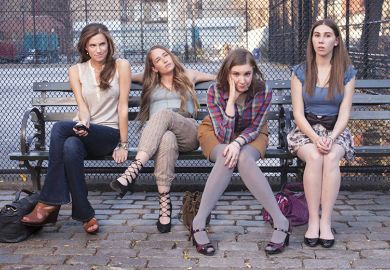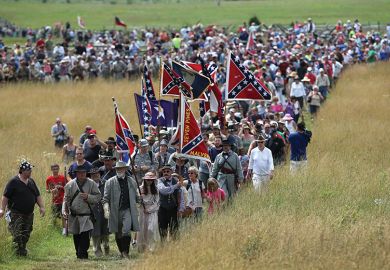There are four broad types of cultural analysis. One can choose the formalist approach, which lifts a cultural work free of its context in order to examine its internal logic, or alternatively select the historicist method, which returns the work to that context in order to understand it. But though these two modes are generally at daggers drawn, they can also be combined to produce two further perspectives: historical formalism, which detects the stealthy motions of history in the forms of a cultural artefact, rather than just in its raw content; and cultural materialism, which also looks at historical forms, but this time in the sense of the technologies and social institutions that mediate between the particularity of art on the one hand and the generality of "history" on the other.
Though he might jib at the "cultural materialist" label, Colin MacCabe is certainly a card-carrying cultural technologist, whose fascination lies less with concrete texts or abstract theory than with media, audiences, pedagogy, censorship, curricula and questions of literacy. His professional career, from spurned Cambridge structuralist to Strathclyde chair, Pittsburgh, professor and head of production at the British Film Institute, has involved an extraordinary double-act as don and cultural commissar, academic and apparatchik. As a naturally amphibious creature, the London-Irish MacCabe has been one of the forlornly few links between radical theory and public policy, equally well versed as he is in Chomskyan linguistics and film copyright law, floating the signifier and pinning down business sponsorship for the arts. If he wants to test out the truth of the "author is dead" doctrine, he turns not to Barthes or Foucault but to the messy, hand-to-mouth business of making a movie. An avant-gardist-turned-administrator, his bloodless, briskly instrumental prose smacks more of the CEO's memorandum than the philosopher's meditation; he uses naff phrases like "crystal clear" and "to my incredible surprise", and his prose suffers from just a touch of self-importance. But these worldly-wise collected essays also reveal a capacity for sheer intellectual excitement well beyond that of most literary academics. They represent a kind of theorising on the hoof, as one imagines their author dashing from the BBC to the BFI, jotting down his thoughts about Milton or mass literacy on the back of a taxi receipt. Few pieces in this volume travel beyond ten or so pages; like the writings of Stuart Hall, they are the working notes of an intellectual activist rather than the esoteric reflections of the theorist.
They also reveal the obtuseness of any simple-minded contrast between traditional literary pursuits and the world of cultural studies. MacCabe, who can shift easily from Hegel to Hancock's Half Hour , is progressively minded precisely because he is in some ways so thoroughly traditional. He springs not from the media studies department of some ex-polytechnic but from Cambridge English, and what led him to Derek Jarman and Jean-Luc Godard was as much in line with that lineage as in revolt against it. Two aspects of Cambridge English - its social and historical sense of literature, and its relative openness to literary modernism - inform these pieces to their roots. The Cambridge-bred film journal Screen, of which MacCabe was a co-editor, was in its own leftist way just as self-consciously rigorous, loftily dismissive, militantly vanguardist and coterie-minded as F. R. Leavis's Scrutiny . The same excess of moral seriousness disfigured them both. Indeed, MacCabe quotes in this book a statement from Leavis about the nature of literary criticism that might have sprung straight from a contemporary cultural studies brochure. And little in this volume would have been possible without the influence of Raymond Williams who, like Leavis and MacCabe, both embodied and dissented from Cambridge English values.
Where MacCabe first discovered the importance of the material forms of culture was not in marketing or video but in that most venerable of "Cambridge" inquiries, the history of the English language. There are essays here on the inter-relations between speech, writing, printing technology and political power, which ask among other things how what began as a socially despised "Anglo-Latin creole" ended up as the official or joint official language of more than 70 states throughout the world. Other pieces on film, television and popular culture take their cue from this materialist concern with cultural institutions. Cultural studies, MacCabe claims, must be set in the longest of historical perspectives, a claim that he illustrates by proposing ancient Athenian drama, Elizabethan theatre and the advent of television as comparably momentous moments of cultural history, all of them straddling "high" and "low" culture. He also throws in a perceptive parallel between the Elizabethan university wits and today's Monty Python-type satirists.
What finally dismantles the high/low opposition is of course cinema - "properly the postmodern art", as MacCabe comments - which has managed to chalk up an impressive array of masterpieces while appealing to almost everyone. But the book is no wide-eyed apologia for yet another batch of MA theses on Neighbours . "The analysis of contemporary capitalist forms of culture", MacCabe admonishes, "is almost always divorced from the analysis of traditional forms with a remarkable impoverishment of both". If he has abandoned his former Marxism, high theory and modernist vanguardism, it is not in the name of some brittle postmodernist relativism. Latin is a fine language, but not as fine for science as English; Glaswegian is quite as worthy as standard English, but not so useful for certain international forms of communication. The isolated study of "English" should yield ground to the study of "the whole range of cultural productions", but literature is after all a mightily important component of this field, and the point is to place the new and old media in fruitful commerce, not dogmatically to privilege one over the other. It is the traffic between new technology and traditional culture that fires MacCabe's imagination, and he is one of the few intellectuals who see that where it matters most of all is in the school classroom. Today's crisis of literacy, he thinks, is a lot more than the figment of right-wing paranoia; but the truth is that basic literacy never brought much cultural or political benefit to most of those who enjoyed it and the traditional literary values now hotly defended by some commentators probably never spread to more than 5 or 10 per cent of the population in the first place. On the other hand, each time television serialises a Jane Austen or George Eliot classic, tens of thousands of copies of the books are sold. And if the new media have played their part in a new illiteracy, more and more highly literate types are needed to run these institutions. A postmodern capitalism that lowers cultural standards for some raises them steeply for others. As always, it is not a question of rising or declining standards in general, but of what one might call the social distribution of cultural capital.
For the professional pessimists, however, the only sure thing about cultural standards is that they were once higher. Most conservative critics, from Samuel Johnson to T. S. Eliot, have adopted a "deteriorationist" case about culture, though Eliot is torn between the view that things are not what they used to be and the belief that they are as bad as they always were. The unspeakably prosaic truth, far too banal to pluck a book out of, is that some things used to be better and some worse. John Springhall's Youth, Popular Culture and Moral Panics shows us how today's moral outrage over the insidious effects of the media was prefigured in spasmodic fits of hysteria over such popular Victorian pursuits as the penny theatre and the penny dreadful. So much for Victorian values. Like much popular culture, these demonised forms of entertainment were for the most part morally orthodox and politically conservative, but what the middle class really objects to is the dangerous stimulation of plebeian senses.
The very class in Victorian England that impugned these evils was the one that reaped enormous profits from them, just as some Conservative politicians today praise commercial radio out of one side of their mouths while condemning poems that do not rhyme out of the other. Gripped by the notion that there is something profoundly subversive about people enjoying themselves, the Anglo-Saxon middle classes, so Springhall demonstrates, have continued to indulge in regular spasms of wrath over everything from gangster films to "gangsta rap". The book has a particularly fascinating section on the relation between the American fear of mass culture and McCarthyism. One right-wing US polemic alleged that two comic-book companies were staffed entirely by homosexuals, "operating out of our most phalliform skyscraper".
It is not true, then, that things are not what they used to be. It is rather that they are as bad as they always were. Just as the modernist demand to break with history has an exceedingly long history, so the complaint that popular culture is degenerating would seem to run back to ancient times. We are by definition always posterior to the golden age in which the Common Man alternated a spot of Morris dancing with a snatch of Homer. Even so, the vote-catching brand of academic populism for which mass culture can do little wrong is music to the ears of those who grow rich on the cultural deprivation of others. If high culture tends to fetishise the past, cultural populism tends to erase it; but nostalgia and amnesia are sides of the same coin. It was Williams, our wisest advocate for the eloquence of the vulgar, who pointed out in his Culture and Society that a society that had only its contemporary experience to live by was poor indeed. But he also insisted that all tradition is a constant selection and reselection of ancestors, from the inevitably partisan vantage point of the present. There is, after all, an alternative to a conservative veneration of the past on the one hand, and an avant-garde disavowal of it on the other. What puts both cases in question is the idea of a radical tradition. In grasping this truth, MacCabe is an inheritor of that dissenting tradition from Leavis and Empson to Williams, that was neither dully conformist nor callowly iconoclastic, but that was rather, in Leavis's poignant words, "Cambridge in spite of Cambridge".
Terry Eagleton is professor of English literature, University of Oxford.
The Eloquence of the Vulgar: Language, Cinema and the Politics of Culture
Author - Colin MacCabe
ISBN - 0 85170 677 0 and 678 9
Publisher - British Film Institute
Price - £40.00 and £14.99
Pages - 184
Register to continue
Why register?
- Registration is free and only takes a moment
- Once registered, you can read 3 articles a month
- Sign up for our newsletter
Subscribe
Or subscribe for unlimited access to:
- Unlimited access to news, views, insights & reviews
- Digital editions
- Digital access to THE’s university and college rankings analysis
Already registered or a current subscriber? Login



